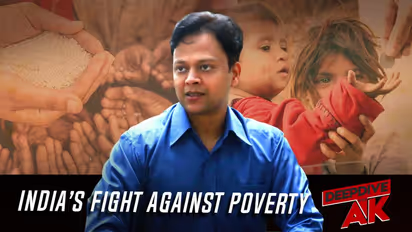
India has achieved yet another feat. India has registered the fastest absolute reduction in the Multidimensional Poverty Index (MPI) among 10 developing countries who have a combined population of two billion people. Deep Dive with Abhinav Khare explores the poverty-ridden corners of the country today.
From 2006 to 2016, India has lifted 271 million people out of poverty thus becoming the fastest country to do that. India has also halved the number of people living in poverty from 64 crores in 2006 to 36.9 crores in 2016. However, the intensity of poverty, which defines the standard of living of people has decreased negligibly from 51.1% to 43.9% which shows that the face of deprivation hasn’t changed much.
The Sustainable Development Goal 1 speaks of ending poverty “in all its forms, everywhere” and the 2019 global Multidimensional Poverty Index (MPI) and all 10 countries - Bangladesh, Cambodia, Democratic Republic of Congo, Ethiopia, Haiti, India, Nigeria, Pakistan, Peru and Vietnam with a total population of 2 billion have shown tremendous progress in achieving the same.
MPI is an overarching index which helps us in capturing both incidents and intensity of poverty. The MPI is measured across 10 indicators which include health, education and standard of living. The data for India has been sourced from the National Family Health Survey round three in 2005-2006 and round four 2015-2016.
Also read: How India, Russia, US relations have evolved since 1971 Indo Pakistan war?
Jharkhand is one of the poorest regions who has improved the fastest. It has reduced MPI from 74.9% in 2005-06 to 46.5% in 2015-16. The four states with acute MPI are Bihar, Jharkhand, Uttar Pradesh and Madhya Pradesh and Jharkhand has improved the fastest among them.
In India, poverty reduction has been more in rural areas than urban, showing that our rural development policies are actually working. The traditionally backward groups like the Scheduled Castes and Tribes, Muslims, Rural Communities and Young Children are still among the poorest.
In fact, children around the globe, suffer the wrath of poverty more than adults. According to the report, of the total who are multidimensionally poor in the 101 countries, 50 percent are children which implies 663 million children are suffering in poverty.
Also read: Catch and release of Hafiz Saeed puts Pakistan's integrity in question
Despite the success of our policies and programs in reducing poverty, there is no reason to celebrate yet. In India girls are more multidimensionally poor and out of school than boys. 373 million people are still living in severely deprived conditions, 8.8 percent of the population live in acute multidimensional poverty and 19.3 percent of the population are on the verge of the same. So, we should put our celebrations on hold and concentrate more on the betterment of our society and our people.
About Abhinav Khare
Abhinav Khare is the CEO of AsiaNetNews Network and also the host of a daily show named Deep Dive with AK. AsiaNetNews is a leading media group of south India with highly valuable brands like AsiaNetNews, Suvarna News, Kannada Prabha, IndigoMusic, Indigo Radio, MyNation, NewsFast, IndigoXP Music lounges.
He is a proud father of two beautiful daughters and resides in Bengaluru with his loving family and a lifetime collection of books and gadgets. An avid traveller, he has already pinged more than hundred cities from 5 major continents around the globe.
A tech entrepreneur, who is passionate about policy, technology, economy and philosophy from ancient India. His favourite pastime is to research synergy between these facets of society. He earned his qualifications from the top 10 global universities; an MS Engineering from the ETH Zurich and an MBA Finance from the London Business School.